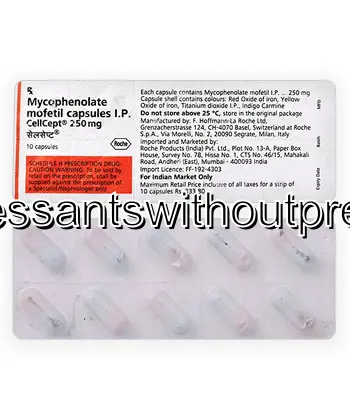| Package | Dosage | Price | Price per Dose | |
|---|---|---|---|---|
| Dosage: 500mg | ||||
| 30 pill | 500mg | AUD384.11 | AUD12.80 | |
| 20 pill | 500mg | AUD338.21 | AUD16.91 | |
| 10 pill | 500mg | AUD202.92 | AUD20.29 | |

Cellcept Description
Overview of CellCept
CellCept is the brand name for mycophenolate mofetil. In Australia it is prescribed to help prevent organ rejection after kidney, heart or liver transplants. It is sometimes used for certain autoimmune conditions under specialist care. The medicine comes as capsules and also as a liquid suspension for children. Some packs include 250 mg or 500 mg capsules, and your pharmacist will explain the right form for you. It is a prescription medicine and must be used under medical supervision.
How it works
Mycophenolate mofetil reduces the activity of the immune system. It blocks a key enzyme needed for immune cell growth. This lowers the chance that the body will reject a transplanted organ. The effect develops gradually over days to weeks, not in a single dose. Because of this, it is used as part of a long-term plan rather than for immediate relief of symptoms.
How to take CellCept in Australia
Your doctor will set the dose based on your situation. Do not adjust the dose without talking to them. Take CellCept with meals to help minimise stomach upset. Swallow capsules whole with a glass of water; do not chew or crush them. If you use the liquid form, measure carefully with the supplied device and shake before each use. Store the medicine at room temperature and keep it out of reach of children. If you miss a dose, take it as soon as you remember unless it is close to the next one—do not double up without medical advice. If you miss several doses, contact your clinic for guidance.
Safety, side effects and warnings
Common side effects include stomach upset, diarrhoea, nausea and headaches. You may feel tired or have mouth ulcers. Because CellCept lowers immune protection, watch for signs of infection such as fever, chills, sore throat or persistent illness and contact your doctor promptly. Regular blood tests and liver function checks are typical during treatment to guide dosing. Rare but serious risks include severe infections, anaemia or bleeding problems. Live vaccines should be avoided while taking CellCept; discuss vaccines with your clinician before travel or vaccination plans.
Pregnancy, contraception and family planning
CellCept can harm a developing fetus. In Australia, women of childbearing potential should use effective contraception during treatment and for an advised period after stopping therapy, as guided by their prescriber. Men may also be advised on contraception in some cases. If pregnancy is planned or suspected, contact your transplant team immediately. Do not discontinue the medicine on your own; your doctor will provide a safe plan.
Drug interactions and monitoring
Tell your doctor about all medicines you take, including non-prescription drugs, supplements and herbal products. CellCept can interact with calcineurin inhibitors such as tacrolimus or ciclosporin, iron supplements, antacids and certain acid-suppressing medicines. Your dose may be adjusted based on blood tests and drug levels in some cases. Do not start or stop other immunosuppressants without medical advice. If you are planning vaccines, check with your clinician about timing and safety.
Availability and cost in Australia
In Australia, CellCept may be subsidised under the Pharmaceutical Benefits Scheme for some transplant indications; other uses are paid privately. Prices vary by dose and form, and generic versions may be available. Your online Australian pharmacy can confirm current stock and the exact price, including any private rebates or subsidised options. If you have private health cover, check whether it helps with out-of-pocket costs.